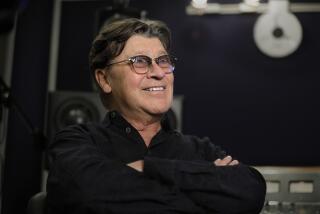‘Hateful Eight’ puts veteran Ennio Morricone’s score center stage
Director Quentin Tarantino had never commissioned a custom film score and is famous for fabricating his soundtracks with existing songs and score cues. He chalks this up — as he said during a recent Q&A at the Directors Guild — to the fact that “I didn’t ever want to trust a composer with the soul of my movie.”
But that’s exactly what Tarantino did with his new movie, “The Hateful Eight.” And he chose wisely.
Ennio Morricone, the five-time Oscar-nominated composer of “The Mission” and “The Good, the Bad and the Ugly,” did the score — including the old-fashioned overture — for Tarantino’s bloody new western, which opened on Christmas Day.
See more of Entertainment’s top stories on Facebook >>

Tarantino had relied on classic Morricone cues aplenty in soundtracks for previous films, and “a little voice” told him the subject and tone of “Hateful Eight” warranted exploring more traditional movie-scoring territory. The composer jumped at the chance.
“There was no hesitation,” said Morricone, 87, by phone from his home in Rome. It wasn’t the first time the Oscar-winning writer-director had asked him to collaborate.
“Tarantino actually asked me to make an original soundtrack for ‘Inglourious Basterds,’” Morricone said. “There just was no time.”
The director sent his script for “Hateful Eight,” translated into Italian, to Rome this summer. “The script was absolutely interesting,” said Morricone (via translator). “But I was also encouraged implicitly by the fact that he used a lot of my music in his other movies.”
The two men then met in Rome, and when Tarantino told the composer he would need the score in a month, Morricone initially said he would have time only to write a main theme. Knowing how Tarantino was inspired by John Carpenter’s “The Thing,” Morricone suggested fleshing out the soundtrack with music he’d written in 1982 for Carpenter’s film that ultimately went unused.
But the composer found himself writing more and more new music. “He asked me for some pieces for important moments of the film,” said Morricone, “but I actually wrote much more on the basis of what I read in the script.” (Ultimately Tarantino employed only two unused “Thing” cues.)
Morricone’s score takes center stage from the outset, in the overture Tarantino uses to kick off his throwback western. The audience at a recent screening in L.A. erupted in applause when the composer’s name appeared on-screen, and it’s clear Ennio Morricone lends as much vintage credibility as “Eight’s” nostalgic 70-millimeter film stock and roadshow presentation.
“I don’t consider it a western movie,” Morricone noted. “I think it’s an adventure movie.” Hence, the score doesn’t employ the Fender electric guitar and whistling that distinguished his famous spaghetti westerns. Instead, he wrote music befitting the horror genre, where tiptoeing strings and queasy woodwinds create a slow, sinking sense of foreboding doom.
“I don’t think it is music for a horror movie,” he protested. “But this depends, maybe, on your culture, or the way you see music for a horror movie.”
The disconnect of genre expectations may be due, in part, to the fact that Morricone wrote the entire score having only read the script. “Tarantino didn’t want to show me the film, and he was absolutely right,” said Morricone. “It was almost impossible not to understand how it was going to be, because [the script] was really full of details, to the point of a character would touch his hat, or smoke a cigarette.”
Morricone wrote 35 minutes of score (which he orchestrated entirely himself) in just two weeks, and recorded it over a week with the Czech National Symphony Orchestra in Prague.
Walter Goggins, one of the film’s stars, attended an additional session last month at Abbey Road Studios, where the music was recorded directly to vinyl for a special soundtrack release. “What I saw watching [Tarantino] watch the maestro conduct music for his score was such childlike enthusiasm,” said Goggins.
Tarantino has declared Morricone his favorite composer, so it’s not surprising that the Italian idol would make him feel like a kid again. But time will tell if this experience will change how he approaches soundtracks for future films.
If he does decide to commission another original score, he knows at least one interested party. “I’m totally happy that I worked with Tarantino,” said Morricone. “I would be ready to work with him next time.”
Morricone is feeling well these days (he had to cancel three North American concerts last summer because of an injury), although doctors have insisted he avoid long flights for now. There’s a simple reason the man — who started composing when he was 6, has more than 500 film and TV credits, and turns 90 in three years — keeps working.
“I love my job,” he said simply. “I love writing music.”
More to Read
The biggest entertainment stories
Get our big stories about Hollywood, film, television, music, arts, culture and more right in your inbox as soon as they publish.
You may occasionally receive promotional content from the Los Angeles Times.










